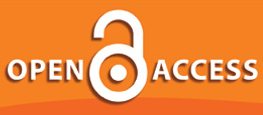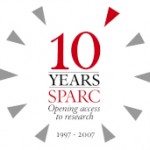 Summary. Because education and the free exchange of information are central to a stable democracy, open access is an essential part of national security. Open Access Week is an initiative to increase public awareness about the importance of open access.
Summary. Because education and the free exchange of information are central to a stable democracy, open access is an essential part of national security. Open Access Week is an initiative to increase public awareness about the importance of open access.
“Open Access is a growing international movement that uses the Internet to throw open the locked doors that once hid knowledge. It encourages the unrestricted sharing of research results with everyone, everywhere, for the advancement and enjoyment of science and society. Open Access is the principle that all research should be freely accessible online, immediately after publication, and it’s gaining ever more momentum around the world as research funders and policy makers throw their weight behind it. The Open Access philosophy was firmly articulated in 2002, when the Budapest Open Access Initiative was introduced. It quickly took root in the scientific and medical communities because it offered an alternative route to research literature that was frequently closed off behind costly subscription barriers.” [1]
 SPARC. The Alliance for Taxpayer Access is administered by The Scholarly Publishing and Academic Resources Coalition (SPARC), an international alliance of academic and research libraries working to correct imbalances in the scholarly publishing system. Developed by the Association of Research Libraries, SPARC has become a catalyst for change. Its pragmatic focus is to stimulate the emergence of new scholarly communication models that expand the dissemination of scholarly research and reduce financial pressures on libraries. Action by SPARC in collaboration with stakeholders – including authors, publishers, and libraries – builds on the unprecedented opportunities created by the networked digital environment to advance the conduct of scholarship. According to the Scholarly Publishing and Academic Resources Coalition (SPARC), “we do not get access to all of the over $60 billion of research that we, as students and taxpayers, pay for every year.” [2]
SPARC. The Alliance for Taxpayer Access is administered by The Scholarly Publishing and Academic Resources Coalition (SPARC), an international alliance of academic and research libraries working to correct imbalances in the scholarly publishing system. Developed by the Association of Research Libraries, SPARC has become a catalyst for change. Its pragmatic focus is to stimulate the emergence of new scholarly communication models that expand the dissemination of scholarly research and reduce financial pressures on libraries. Action by SPARC in collaboration with stakeholders – including authors, publishers, and libraries – builds on the unprecedented opportunities created by the networked digital environment to advance the conduct of scholarship. According to the Scholarly Publishing and Academic Resources Coalition (SPARC), “we do not get access to all of the over $60 billion of research that we, as students and taxpayers, pay for every year.” [2]
![]() ATA. The Alliance for Taxpayer Access is a coalition of patient groups, physicians, researchers, educational institutions, publishers, and health promotion organizations that support barrier-free access to taxpayer-funded research. [3]
ATA. The Alliance for Taxpayer Access is a coalition of patient groups, physicians, researchers, educational institutions, publishers, and health promotion organizations that support barrier-free access to taxpayer-funded research. [3]
ATA Campaign. The ATA TaxpayerAccess.org campaign is an effort to ensure and enforce taxpayer access to publicly funded research through the Federal Research Public Access Act.
Every year, the federal government funds tens of billions of dollars in basic and applied research. Most of this funding is concentrated within 11 departments/agencies (e.g., National Institutes of Health (NIH), National Science Foundation (NSF), Department of Energy). The research results typically are reported in articles published in a wide variety of academic journals. From NIH funding alone, it is estimated that about 65,000 papers are published each year. The Federal Research Public Access Act proposes to make manuscripts reporting on federally funded research publicly available within six months of publication in a journal. [4]
ATA Principles. ATA is directed by the Scholarly Publishing & Academic Resources Coalition (SPARC), an alliance of academic and research libraries and organizations committed to the promotion of systems that capitalize on the networked environment to disseminate research. The Alliance for Taxpayer Access is committed to the following four general principles:
- American taxpayers are entitled to open access on the Internet to the peer-reviewed scientific articles on research funded by the U.S. Government.
- Widespread access to the information contained in these articles is an essential, inseparable component of our nation’s investment in science.
- This and other scientific information should be shared in cost-effective ways that take advantage of the Internet, stimulate further discovery and innovation, and advance the translation of this knowledge into public benefits.
- Enhanced access to and expanded sharing of information will lead to usage by millions of scientists, professionals, and individuals, and will deliver an accelerated return on the taxpayers’ investment.
- ATA advances these principles through advocacy of US Government-wide public access and other policies that support the sharing of science made possible by the Internet and taxpayer investments. [5]
Open Society Institute. The Open Society Institute works to build vibrant and tolerant democracies whose governments are accountable to their citizens. To achieve its mission, OSI seeks to shape public policies that assure greater fairness in political, legal, and economic systems and safeguard fundamental rights. On a local level, OSI implements a range of initiatives to advance justice, education, public health, and independent media. At the same time, OSI builds alliances across borders and continents on issues such as corruption and freedom of information. OSI places a high priority on protecting and improving the lives of people in marginalized communities. [6]
__________
2. ALR.org
6. Soros.org